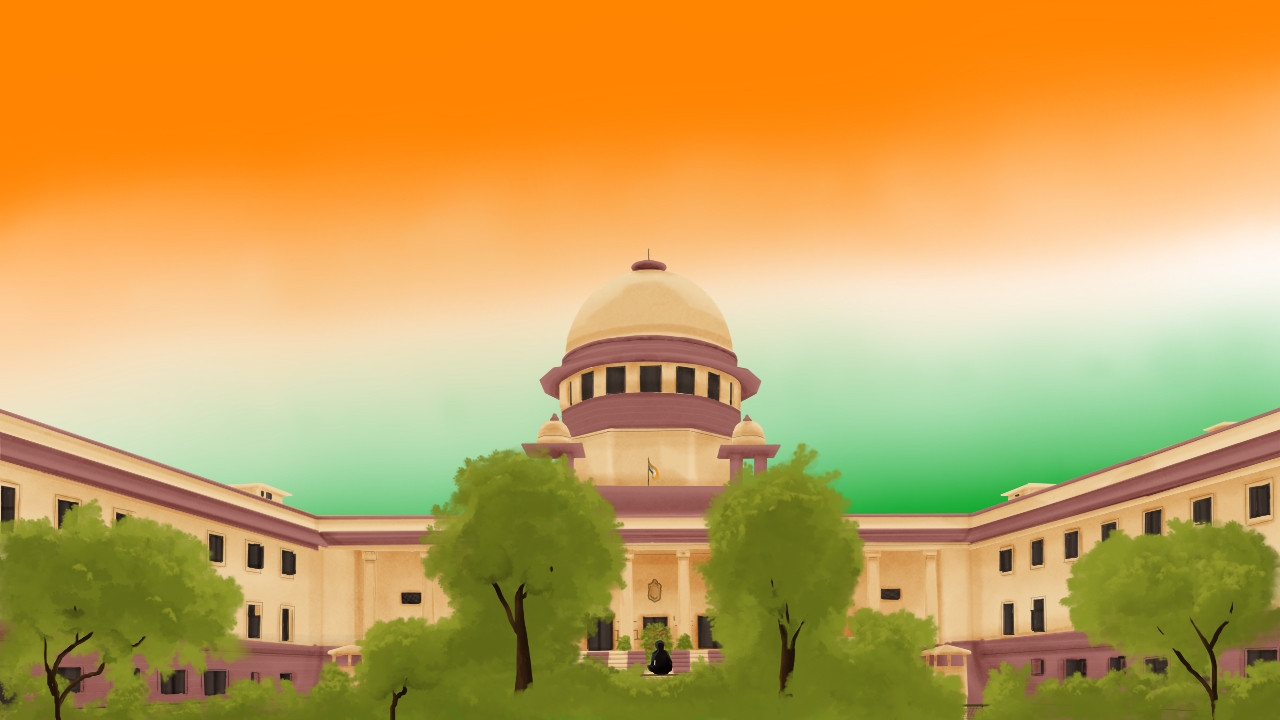


The Supreme Court on Tuesday said that the political alignment of the founders of Aligarh Muslim University (AMU) during British times will not have a bearing in determining the institute's minority status today [Aligarh Muslim University Through its Registrar Faizan Mustafa v Naresh Agarwal and ors].A Constitution Bench of Chief Justice of India (CJI) DY Chandrachud and Justices Sanjiv Khanna, Surya Kant, JB Pardiwala, Dipankar Datta, Manoj Misra and Satish Chandra Sharma said that the founders' could have been aligned with Mahatma Gandhi or Khilafat but that will not have any bearing on the institute's minority status.This was after Solicitor General (SG) Tushar Mehta who was appearing for the Central government, submitted that every historian has described the founders of AMU as loyal to the British.The CJI then remarked,
"Let us say there were two factions (of the founders). Loyalists, those supporting Gandhi .. or those of Khilafat who branched out to form Jamia. Their loyalty does not mean the institute's minority character changes or the same has a bearing depending on if they are aligned or opposed to the then executive."Today marked the fourth day of hearing in a batch of petitions concerning the minority status of Aligarh Muslim University (AMU).The questions of law involved in the case concerns the parameters for granting an educational institution minority status under Article 30, and whether a centrally-funded university established by parliamentary statute can be designated a minority institution.The matter was referred to a seven-judge in February 2019 by a bench led by then CJI Ranjan Gogoi.AMU was held to be a Central University by the Supreme Court in the 1968 case of S Azeez Basha vs Union of India. In the said case, the Court also held that a minority status under Articles 29 and 30 of the Indian Constitution cannot be conferred on a Central University.However, the minority status of the institute was later reinstated by bringing in an amendment to the AMU Act in 1981.This was challenged before the Allahabad High Court which in 2006 set aside the move as being unconstitutional, leading to the instant appeals by AMU before the Supreme Court.Notably, in 2016, the Central government withdrew its appeal in the matter.Final hearings in the matter had begun on January 9, when the apex court had observed that an educational institute is not barred from enjoying minority status merely because it is regulated by a statute.On January 10, Senior Advocate Kapil Sibal had argued that Muslims in India are worse off than Scheduled Castes in terms of education and they can only be empowered through education.
Hearing today
In response to arguments by advocate MR Shamshad (for the petitioners), the CJI stated that a minority institute can say that it has the choice to establish a school but it cannot say that it has to be recognised when it comes to conferring degrees without an enabling statute or legal regime."You do not have to give up the minority status if you seek aid and that is fairly well established."Attorney General for India R Venkataramani stressed that Article 30 of the Constitution on right to establish and administer minority institutions is an enabling provision
The CJI then posed the question,
"It cannot be that I as a State decided to whether to grant or not the status, it is not enabling in that sense ... Is it the fact that an institution created under a statute has a bar to get a minority status? Suppose there is a minority trust that creates an university; now the foundation is itself a minority. So is there a bar for the university to have a minority recognition?"Senior Advocate Rajeev Dhavan (for the petitioners) asked the SG to stick to the pleadings rather than rely on books that allege the AMU founders' loyalties lay with the British.These are broadly the parameters we drew up in the 370 judgment. Something in a book is ultimately secondary compared to official records. But you know we have to be little careful with underlying material from books because it depends on which side you are," the CJI then stated.The SG then emphasised that the decision in Basha had recorded a finding that AMU had surrendered its claim to being a minority institute."Historically others did not (surrender) though they had option. But they (AMU) continued their existence de hors the government. No Article 30 was in existence. Post-Independence many institutes were recognised as deemed etc. but that option this particular Institute did not exercise and therefore Basha said they have surrendered (minority status). I do not sit in judgment over that. May be their stand was beneficial for them or the community (at the time)," he added.Dhavan then argued that any such surrender was only with respect to (government) property.
The CJI said that teaching non-minority subjects will not have a bearing on the minority status of the institute."In 1920, they did not have benefit of being (recognised) as minority institute. Question is post-Constitution whether they got such status based on its establishment. Can it acquire?" CJI Chandrachud asked.Justice Khanna then stated that the issue issue is whether day-to-day administration should vest with the community."They may have a denominational character. But when you agree to terms and conditions of the government and agree to be dissolved, then your earlier status goes and that is how surrender happens," the SG remarked in conclusion.The hearing will continue on Wednesday.
TAGS: Supreme Court AMU Aligarh Muslim University minority status Constitution Bench